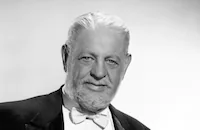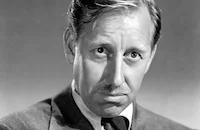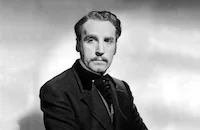Thrill of a Romance

Brief Synopsis
Cast & Crew
Richard Thorpe
Van Johnson
Esther Williams
Frances Gifford
Henry Travers
Spring Byington
Film Details
Technical Specs

Synopsis
While working at a city pool in Los Angeles, swimming instructor Cynthia Glenn catches the attention of Robert G. Delbar, a visiting businessman. Robert falls instantly in love with Cynthia and embarks on an aggressive campaign to win her affections. He begins by sending a bouquet of flowers every day to Cynthia's home, where she lives with her absentminded aunt Nona and her uncle Hobart. Robert takes Cynthia to the horse races, the ice follies and fancy restaurants until she finally succumbs to his persistence and consents to marry him. Following the wedding, Robert and Cynthia take their honeymoon in the mountains, at the Hotel Monte Blava, but Robert is forced to leave on business a short time after they arrive. Left to entertain herself at the resort, Cynthia befriends Nils Knudsen, the kindly star of the Metropolitan Opera. Nils, who is on a strict weight loss diet, dines at the hotel under the watchful eye of his sweetheart, Sarah Fenway, who is also the manager of the hotel. Cynthia also befriends Major Thomas Milvaine, a celebrated young war hero, and Maude Bancroft, the daughter of the businessman accompanying Robert to Washington. As the days pass, Cynthia teaches Thomas how to swim, while he regales her with war stories and accompanies her on mountain hikes. Meanwhile, Nils repeatedly tries to cheat on his diet, and even refuses to sing with Tommy Dorsey's orchestra unless the band leader brings him a steak. Though preoccupied by his appetite, Nils finds time to counsel Cynthia, who has fallen in love with Thomas. As the day of Robert's return approaches, Thomas and Cynthia grow increasingly frustrated that their brief romance will soon end. Maude, who is also aware that Cynthia and Thomas have fallen in love, secretly arranges a week-long delay to Robert's return, but the delay makes their inevitable separation all the more painful. One afternoon, Cynthia sets out for a solitary hike in the mountains to take her mind off her heartbreak, but Thomas finds her in the woods and joins her. As night approaches, the two hikers realize that they are lost, and decide to camp in the woods overnight and try find their way back to the hotel in the morning. Meanwhile, back at the hotel, Nils is overjoyed when he meets a doctor who tells him that he can forget his diet and eat and drink just about everything he desires. When Robert returns to the hotel the following morning, he discovers that his wife did not sleep in her room the previous night, and angrily accuses Cynthia of infidelity when she returns with Thomas later in the day. Cynthia calls Robert a "stuffed shirt," and later admits that she is in love with Thomas. After agreeing to an annulment, Cynthia moves back home to be with her aunt and uncle. Nils, realizing that he must help reunite Cynthia and Thomas, arranges a romantic serenade for Cynthia outside her aunt and uncle's house. With vocal help from Nils, Thomas captivates Cynthia with a song, and the resumption of their romance is all but assured.

Director

Richard Thorpe
Cast

Van Johnson

Esther Williams

Frances Gifford

Henry Travers

Spring Byington

Lauritz Melchior
Carleton G. Young
Ethel Griffies

Donald Curtis
Jerry Scott
Fernando Alvarado
Helene Stanley

Vince Barnett
Billy House
Joan Fay Macaboy
Tommy Dorsey
Carli Elinor

Thurston Hall
King Sisters
Alex Novinsky
Stuart Holmes
Lucille Casey
Elizabeth Dailey
Aileen Haley
Beryl Mccutcheon
Erin O'kelly
Frances Donelon
Mary Jane French
Dorothy Ford
Eve Whitney
Alice Wallace
Danna Mcgraw
Tom Brannigan
Hugh Maguire
Evelyn Del Rio
Bobby Walberg
Winifred Flyn
Gerald Mackey
Dolores Hall
Art Buehler
Arno Frey
Eugene Borden
David Dagmar
Rudy De Saxe
Tony Coppalla
Albert Godderis
Warren Mills
Dick Earle
Virginia Brissac
Jack Baxley

Pierre Watkin
Jane Isbell
Mimi Cassell

Frank Ferguson
Selmer Jackson

Tim Murdock

Jean Porter
Jessie Arnold

Grace Ford
Wally Boag
Fulton Burley
Douglas Cowan

Henry Daniell
Phil Hanna
Joe Sullivan
Robert E. O'connor
Dagmar Oakland
Harold Miller
Peggy Leon
Crew
Ralph Blane
George Boemler
Jack Bonar
Earl Brent
Sammy Cahn
Richard Connell
Richard Connell
Guy D'hartelot
Mark Davis
Jack Dawn
Kay Dean
Peter P. Decker
Ted Duncan
Joe Edmondson
Sammy Fain
Ralph Freed
Sid Garris
Cedric Gibbons
Edvard Grieg
Victor Herbert
Irene
Calvin Jackson
Henri Jaffa
Al Jennings
Natalie Kalmus
Sam Leavitt
Gladys Lehman
Robert Z. Leonard
Ruggiero Leoncavallo
Franz Liszt
Michael Marmarosa
J. Macklyn Maskill
Warren Newcombe
Fred Norman
Ruth Nurmi
Joseph Nussbaum
Sy Oliver
Joe Pasternak
Hans Peters
Nikolay Rimsky-korsakov
William J. Saracino
Franz Schubert
Jack Shea
Douglas Shearer
Robert W. Shirley
Newell Sparks
William Steinkamp
Michael Steinore
Georgie Stoll
Georgie Stoll
Axel Stordahl
Harry Stradling
Marvin Stuart
Edward Teschemacher
Kay Thompson
Richard Wagner
Paul Weston
John A. Williams
Edwin B. Willis
Hugo Winterhalter

Film Details
Technical Specs

Articles
Thrill of a Romance
Williams and Johnson find themselves surrounded by some impressive musical talent in Thrill of a Romance. Opera star Lauritz Melchior makes his presence known as soon as the credits roll. He opens Thrill of a Romance singing in close up over his billing as "The Metropolitan Opera Star." In this, his first film role, Melchior is cast as an opera star on a diet who plays cupid for Williams and Johnson. As Melchior's screen credit fades, the movie segues into the music of popular bandleader Tommy Dorsey and his orchestra.
Thrill of a Romance was one of a number of film appearances Dorsey and his orchestra made at MGM in the 1940s. Other Dorsey films include Girl Crazy (1943), DuBarry Was a Lady (1943) and Broadway Rhythm (1944). Dorsey first formed an orchestra in the late 1920s with brother Jimmy. Appropriately called The Dorsey Brothers Orchestra, the band featured some big names such as trombonist Glenn Miller and crooner Bing Crosby. But the Dorsey brothers fought constantly and eventually split up in 1935, each forming his own orchestra. The brothers did come together for one film - 1947's The Fabulous Dorseys. They eventually reunited in 1953 and went on to have a popular variety show on CBS, called Stage Show, that featured the first television appearance of Elvis Presley.
Lauritz Melchior was 55 when he made his film debut in Thrill of a Romance. Melchior was born in Copenhagen on March 20, 1890. He first appeared with the Copenhagen Royal Opera in 1913 and made his U.S. debut with the Metropolitan Opera in 1926. MGM producer Joe Pasternak heard Melchior on the radio and brought the tenor to Hollywood where he made several films for the studio between 1945 and 1948. There was Two Sisters from Boston (1946) with Kathryn Grayson and June Allyson, This Time for Keeps (1947) again with Esther Williams and Jimmy Durante and Luxury Liner (1948) with George Brent and Jane Powell. Melchior was reportedly delighted with his film work, while the manager of the Metropolitan Opera was less than thrilled. Melchior did not renew his contract with the opera but he kept busy with TV guest appearances and concerts. And he appeared in one more film - for Paramount - The Stars Are Singing (1953).
Also worth noting in Thrill of a Romance are The King Sisters, one of the big band era's most popular singing groups. Another familiar face is Henry Travers who plays Williams' Uncle Hobart in the film. Travers is best know for playing angel Clarence in It's a Wonderful Life (1946).
Producer: Joe Pasternak
Director: Richard Thorpe
Screenplay: Richard Connell, Gladys Lehman
Cinematography: Harry Stradling, Sr.
Film Editing: George Boemler
Art Direction: Cedric Gibbons, Hans Peters
Music: Ralph Blane, Earl Brent, Sammy Fain, Ralph Freed, Jack Meskill, George Stoll, Axel Stordahl, Kay Thompson, Paul Weston
Cast: Van Johnson (Maj. Thomas Milvaine), Esther Williams (Cynthia Glenn), Frances Gifford (Maude Bancroft), Henry Travers (Hobart Glenn), Spring Byington (Nona Glenn), Lauritz Melchior (Nils Knudsen).
C-105m. Closed captioning.
by Stephanie Thames

Thrill of a Romance
TCM Remembers Van Johnson - Important Schedule Change on TCM In Honor To Salute VAN JOHNSON
The new schedule for the evening of Tuesday, December 23rd will be:
8:00 PM In the Good Old Summertime
9:45 PM A Guy Named Joe
12:30 AM Thirty Seconds Over Tokyo
2:30 AM The Last Time I Saw Paris
4:30 AM Thrill of a Romance
Van Johnson (1916-2008)
Van Johnson, the boyish leading man whose clean cut, All-American appeal made him a top box-office draw for MGM during World War II, died on December 12 in Nyack, New York of natural causes. He was 92.
He was born Charles Van Dell Johnson on August 25, 1916, in Newport, Rhode Island. By his own account, his early childhood wasn't a stable one. His mother abandoned him when he was just three and his Swedish-born father offered little consolation or nurturing while he was growing up. Not surprisingly, Johnson found solace in singing and dancing lessons, and throughout his adolescence, he longed for a life in show business. After graduating high school in 1934, he relocated to New York City and was soon performing as a chorus boy on Broadway in shows such as New Faces of 1936 and eventually as an understudy in Rodgers and Hart's musical, Too Many Girls in 1939.
Johnson eventually made his way to Hollywood and landed an unbilled debut in the film version of Too Many Girls (1940). By 1941, he signed a brief contract with Warner Bros., but it only earned him a lead in a "B" programmer Murder in the Big House (1941); his contract soon expired and he was dropped by the studio. Johnson was on his way back to New York, but as luck would have it - in the truest Hollywood sense - friends Lucille Ball and Desi Arnaz introduced him to Billy Grady, a lead talent scout at MGM, which was currently Ball's new studio. Johnson was signed up and almost immediately MGM had a star on its hands.
It might have been slow going at first, with Johnson playing able support in films such as Dr. Gillespie's New Assistant and The War Against Mrs. Hadley (both 1942). By 1943 the studio capitalized on his broad smile and freckles and starred him in two of the studio's biggest hits: A Guy Named Joe and The Human Comedy. Those two films transformed him into a boxoffice draw with a huge following, particularly among teenage girls. A near fatal car accident that same year only accentuated the loyalty of his fans, and his 4-F status as the result of that accident created an opportunity for him when so many other leading actors of the era (James Stewart, Clark Gable) were off to war. Johnson was quickly promoted as MGM'sleading man in war heroics and sweet romancers on the big screen: The White Cliffs of Dover, Thirty Seconds Over Tokyo (both 1944), Thrill of a Romance, the episodic Week-End at the Waldorf (both 1945), and a musical remake of Libeled Lady entitled Easy to Wed (1946).
Hits though these were, it wasn't until after the war that Johnson began to receive more dramatic parts and better material such as supporting Katharine Hepburn and Spencer Tracy in the political farce State of the Union (1948). other significant roles included the well-modulated noir thriller The Scene of the Crime, the grim war spectacle Battleground (both 1949), the moving domestic drama Invitation (1952) in which he played a man who is paid to marry a woman (Dorothy McGuire) by her father. Before he left MGM, he closed his career out in fine form with the sweeping musical Brigadoon, co-starring Gene Kelly and Cyd Charisse; and the lilting soaper The Last Time I Saw Paris (both 1954) with Elizabeth Taylor.
After he left MGM, the parts that came Johnson's way weren't as varied, but he had his moments in The Caine Mutiny (1954), the beguiling romance drama Miracle in the Rain (1956) with Jane Wyman; and his lead performance in one of the first successful made for-TV-movies The Pied Piper of Hamelin (1957). By the '60s, Johnson returned to the stage, and played the title role in London's West End production of The Music Man. He then returned to Broadway in the drama Come on Strong. He still had a few good supporting parts, most notably as Debbie Reynolds' suitor in Norman Lear's scathing satire on marital differences Divorce American Style (1967); and television welcomed his presence on many popular shows in the '70s and '80s such as Maude, Fantasy Island, The Love Boat and of course Murder She Wrote. There was one last graceful cameo in Woody Allen's The Purple Rose of Cairo (1985), yet for the most remainder of his career, Johnson worked mainly on the dinner theater circuit before retiring from showbiz completely by the mid-90s. He is survived by a daughter, Schuyler.
by Michael T. Toole
TCM Remembers Van Johnson - Important Schedule Change on TCM In Honor To Salute VAN JOHNSON
Quotes
Trivia
Notes
The working title of this film was Thrill of a New Romance. Pre-production news items in Hollywood Reporter indicate that Robert Z. Leonard worked on the film in the capacity of associate producer in late June 1944, at which time he was named to replace Richard Thorpe as director. Hollywood Reporter noted that Thorpe was reinstated as director in mid-July 1944, when Leonard was hospitalized for a "minor ailment." The picture marked the screen debut of the Metroplitan Opera star Lauritz Melchior. A late December 1943 Hollywood Reporter news item indicates that Kathryn Grayson was originally considered for the role played by Esther Williams, and a June 1944 Hollywood Reporter news item notes that Charles Sorel was originally cast in the role played by Henry Travers. Various contemporary news items in Hollywood Reporter list Ann Lundeen, Frank Mayo and Jack Perrin in the cast, but their appearance in the released film has not been confirmed. Some filming took place at Yosemite National Park, Lake Arrowhead and Alhambra, CA.















